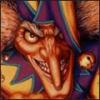Do dynamic pointers exist?
Say I have two structures.
struct object
{
int active;
};
struct creature
{
int active;
};
Is there a way to make a pointer that can point to either one on demand? I''m new to pointers so I''m not sure how this would work or even if it is possible.
In main() you would declare everything.
struct object object1;
struct creature creature1;
struct pointer *ptr; // ???
Then you would somehow make the *ptr point to one or the other at your will.
And if the object or creature is to not be accessible anymore (it dies in the game, for example) then you could just do something like
ptr->active=0;
and it wouldn''t matter if it was an object or creature. It would do it.
Can this be done. If so, how?
If anyone needs an explanation as to why I need to do this I will let you know. It involves those two structures and linked lists.
Thanks for any help.
Just use a void pointer, and cast it to whatever struct it actually points to.
~~~~~~~~~~
Martee
http://www.csc.uvic.ca/~mdill
~~~~~~~~~~
Martee
http://www.csc.uvic.ca/~mdill
ReactOS - an Open-source operating system compatible with Windows NT apps and drivers
you could use inheritance
struct Object
{
int active;
};
struct Creature : public Object
{
};
//main
Creature MyCreature;
Object* pObject;
pObject = &MyCreature
pObject->active = false;
Magmai Kai Holmlor
- The disgruntled & disillusioned
Edited by - Magmai Kai Holmlor on May 24, 2001 8:30:34 PM
struct Object
{
int active;
};
struct Creature : public Object
{
};
//main
Creature MyCreature;
Object* pObject;
pObject = &MyCreature
pObject->active = false;
Magmai Kai Holmlor
- The disgruntled & disillusioned
Edited by - Magmai Kai Holmlor on May 24, 2001 8:30:34 PM
- The trade-off between price and quality does not exist in Japan. Rather, the idea that high quality brings on cost reduction is widely accepted.-- Tajima & Matsubara
Ok. Here's the program I was working with thanks to the suggestion of Martee. It would compile except for the error at the line
printf("ptr.health: %d\n",ptr.health);
Apperantly it has no idea what ptr is.
I know this is kind of a beginner thing. I'm not too familiar with pointers though I think the casting is ok. What is that last printf line supposed to look like? Thanks for any help.
By the way, I work with DJGPP and C only, not C++. Also I wanted an extra, individual pointer to point to one or the other structure. Thank you for your response though, Magmai Kai Holmlor.
Edited by - GameCreator on May 24, 2001 11:56:28 PM
printf("ptr.health: %d\n",ptr.health);
Apperantly it has no idea what ptr is.
|
I know this is kind of a beginner thing. I'm not too familiar with pointers though I think the casting is ok. What is that last printf line supposed to look like? Thanks for any help.
By the way, I work with DJGPP and C only, not C++. Also I wanted an extra, individual pointer to point to one or the other structure. Thank you for your response though, Magmai Kai Holmlor.
Edited by - GameCreator on May 24, 2001 11:56:28 PM
ReactOS - an Open-source operating system compatible with Windows NT apps and drivers
struct object object1;
struct creature creature1;
void *ptr;
ptr = &object1
ptr points to object1, when you want to use object1 through ptr do
(object *)ptr->active
which is the equivalent of object1.active
ptr = &creature1
ptr points to creature1, use it like this
(creature *)ptr->active
i think thats right, maybe the syntax is a bit off, i havent done any programming for a while
Edited by - outRider on May 24, 2001 12:03:17 AM
struct creature creature1;
void *ptr;
ptr = &object1
ptr points to object1, when you want to use object1 through ptr do
(object *)ptr->active
which is the equivalent of object1.active
ptr = &creature1
ptr points to creature1, use it like this
(creature *)ptr->active
i think thats right, maybe the syntax is a bit off, i havent done any programming for a while
Edited by - outRider on May 24, 2001 12:03:17 AM
This topic is closed to new replies.
Advertisement
Popular Topics
Advertisement
Recommended Tutorials
Advertisement








